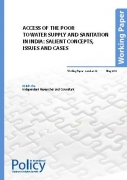Political
Seminar on Indian Northeast Monsoon - Recent Advances and Evolving Concepts (INEMREC) - 2011, Chennai
Posted on 22 Dec, 2010 05:16 PMOrganizers:
Water Jobs via DevNetJobsIndia.org dated December 22, 2010
Posted on 22 Dec, 2010 11:27 AMContent Courtesy: DevNetJobsIndia
- State Consultant, Water Safety and Security
Ma Foi Consulting Solutions Limited
Voelkel Industrie Produkte (VIP) GMBH Exhibiting in EA Water, Mumbai
Posted on 21 Dec, 2010 06:13 PMOrganizer: EA Water Private Limited
Invitation to Nominate 2011 Stockholm Industry Water Award
Posted on 21 Dec, 2010 04:58 PMContent and Image Courtesy: Stockholm Industry Water Award (SIWA)
The Stockholm International Water Institute (SIWI) is a policy institute whose diverse Stockholm-based, internationally-oriented programmes and activities contribute to finding sustainable solutions to the world’s escalating water crisis. SIWI manages projects, synthesises research and publishes findings and recommendations on current and future water, environment, governance and human development issues.
Aquatech India 2011, Amsterdam RAI, Mumbai
Posted on 21 Dec, 2010 03:48 PMOrganizer: Amsterdam RAI
Venue: Bombay Exhibition Centre in Mumbai, India
Description:
Aquatech India 2011 exhibition and conference will showcase a wide spectrum of latest technologies and developments in the field of water and wastewater management. This tradeshow will provide manufacturers and suppliers a secure, recognized and reliable means/approach to enter the water industry.
National Spatial Data Infrastructure (NSDI) 10, FICCI, New Delhi
Posted on 21 Dec, 2010 01:12 PMNational Spatial Data Infrastructure (NSDI) 10
Theme: "National Geospatial Eco-system – The Road Ahead"
7th International India Development Coalition of America (IDCA) Conference , Gurgaon
Posted on 21 Dec, 2010 12:09 PM7th International IDCA Conference in India
Theme: "Working Together to Eradicate Poverty and Mitigate Climate Change"
Action Beyond Dialogue, The Young Changemakers Conclave, 7th Jan 2011, New Delhi
Posted on 21 Dec, 2010 10:44 AMThe Young Changemakers Conclave
Theme: 'Action: Beyond Dialogue'
Organizer: The Young Changemakers Conclave
Topics:
- Human Rights
- Educational Opportunity for all
- Poverty & Hunger
- Environmental Sustainability
- Intercultural Dialogue
- Water: Harvestation & Conservation
Effluent treatment facilities across Golden Corridor does not conform to GPCB norms – A press release by Paryavaran Suraksha Samiti
Posted on 20 Dec, 2010 10:39 PMContent Courtesy: Radical Socialist
Author: Paryavaran Suraksha Samiti
In this press release dated 4th June 2010, the Paryavaran Suraksha Samiti expresses concern that the effluent treatment facilities across the Golden Corridor do not conform to the Gujarat State Pollution Control Board (GPCB) and demands that effluent discharge at Tadgam Sarigam Pipeline, from FETP, Ankleshwar, ECP, Vadodara and CETPs of Ahmedabad be stopped.
Access of the poor to water supply and sanitation in India - Salient concepts, issues and cases by the International Policy Centre for Inclusive Growth
Posted on 20 Dec, 2010 10:04 PM This paper by the International Policy Centre for Inclusive Growth deals with access of the poor to water supply and sanitation in India. It argues that economic, technical, institutional as well as social factors constrain access to safe drinking water and proper sanitation in India for both the urban and rural poor, and that coverage figures do not reflect this restricted access. It finds that, increasingly, communities are being required to manage their own water and sanitation schemes, not just in rural areas but in urban ones as well.
This paper by the International Policy Centre for Inclusive Growth deals with access of the poor to water supply and sanitation in India. It argues that economic, technical, institutional as well as social factors constrain access to safe drinking water and proper sanitation in India for both the urban and rural poor, and that coverage figures do not reflect this restricted access. It finds that, increasingly, communities are being required to manage their own water and sanitation schemes, not just in rural areas but in urban ones as well.
The paper deals with domestic water supply and sanitation and presents a historical overview of the phenomenon in rural and urban India. This is followed by a critique of available figures for coverage which, it is contended, seem exaggerated because they do not account for the several constraints to access. It addresses the specific institutional problems faced in the public sector delivery of these two utilities in India apart from dealing with the parallel yet thus far limited presence of the private sector in these twin arenas.